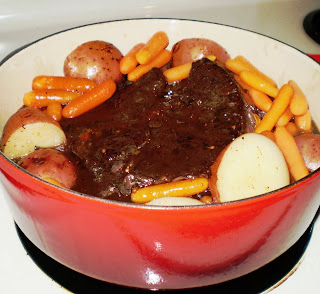Polish Comfort Food
 "Are you hungry?" she'd ask. Before you answered, a plate of ham or kielbasa or a mouth watering golumpki landed in front of you followed by a generous slice of the best cheesecake ever baked or some other more recent dessert discovery. It was best not to eat for days before visiting my husband's favorite aunt.
"Are you hungry?" she'd ask. Before you answered, a plate of ham or kielbasa or a mouth watering golumpki landed in front of you followed by a generous slice of the best cheesecake ever baked or some other more recent dessert discovery. It was best not to eat for days before visiting my husband's favorite aunt.Cioce Sophie (Polish word for aunt and pronounced chuh-chee) and her sisters were easily recognizable as siblings. Short, round women with pretty heart-shaped faces, wide smiles and carrying around Polish cookbooks bought at a church bazaar back in the 1940s. In the margins were dozens of handwritten notes, add a pinch of this, don’t use that; also tucked in the pages were recipes torn from newspapers, scribbled on cards and scrap papers received from each other or one of their friends.
There were at least ten recipes for every Polish specialty because everybody made their pierogi or kapusta just a few ingredients different from the next person. Some experiments went better than others. "Nellie made cabbage and apple pierogi. It wasn't bad," might be met with a nod or a frown depending on who said it.
Cioce Sophie lived to her mid-nineties and some years later her sister Helen, who was my mother-in-law, passed away just shy of her own ninetieth birthday. In the scramble to choose something to hold onto in remembrance, my husband nabbed the recipes and we use them often. When talk in the family turns to the food and fun we all remember so well, Paul always gets a laugh when he says, “I’ve got the cookbook.” Then comes a request for one or another favorite family recipe and he's happy to share. Here's an easy one.
POLISH SUPPER BAKE
1 head green cabbage (Danish cabbage preferred), cut into quarters
2 pounds small red bliss potatoes, halved
1 medium size kielbasa (about 1 ½ pounds), cut into 2 inch chunks
2 cups chicken broth (use low fat, low sodium if using canned)
¼ teaspoon fresh ground pepper
Preheat oven to 325 degrees F. Just throw all the ingredients into a French oven or covered baking dish. Bake at 325 degrees F for 1 to 2 hours until veggies are soft. Serve in large bowls with fresh rye bread. Serves 4-6.



oh yum !! i had a mid school friend who was polish (from a proud polish family, even though this was the time period of the distasteful polish jokes) and they were always talking about keilbasa when i was at their house. either they were eating it, talking about the next time they were going to eat it, etc... thanks for the trip down memory lane.
ReplyDelete